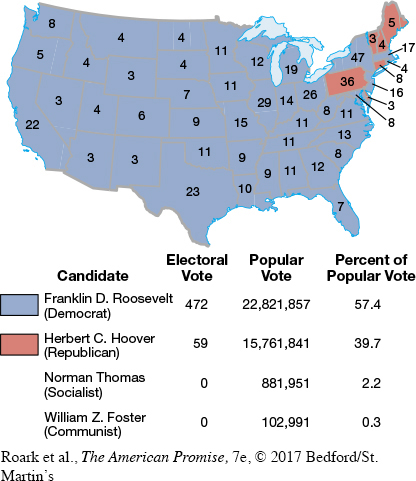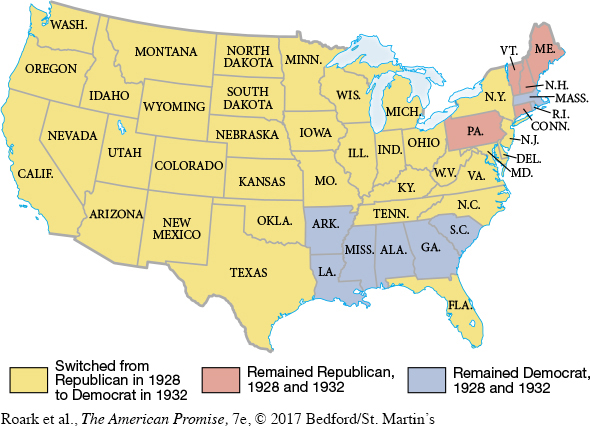The American Promise: Printed Page 682
The American Promise, Value Edition: Printed Page 623
The American Promise: A Concise History: Printed Page 710
The Election of 1932

Democrats knew that Herbert Hoover’s unpopularity gave them a historic opportunity to recapture the White House in 1932. Since Abraham Lincoln’s election, Republicans had occupied the White House three-
The American Promise: Printed Page 682
The American Promise, Value Edition: Printed Page 623
The American Promise: A Concise History: Printed Page 710
Page 683In his acceptance speech, Roosevelt vowed to help “the forgotten man at the bottom of the pyramid” with “bold, persistent experimentation.” Highlighting his differences with Hoover and the Republicans, he pledged “a new deal for the American people.” Few details about what Roosevelt meant by “a new deal” emerged in the presidential campaign. He declared that “the people of America want more than anything else . . . two things: work . . . and a reasonable measure of security . . . for themselves and for their wives and children.” Voters decided that whatever Roosevelt’s new deal might be, it was better than reelecting Hoover.
Roosevelt won the 1932 presidential election in a historic landslide. He received 57 percent of the nation’s votes, the first time a Democrat had won a majority of the popular vote since 1852 (Map 24.1). He amassed 472 electoral votes to Hoover’s 59, carrying state after state that had voted Republican for years (Map 24.2). Roosevelt’s coattails swept Democrats into control of Congress by large margins. The popular mandate for change was loud and clear.

Roosevelt’s victory represented the emergence of what came to be known as the New Deal coalition. Attracting support from farmers, factory workers, immigrants, city folk, African Americans, women, and progressive intellectuals, Roosevelt launched a realignment of the nation’s political loyalties. The New Deal coalition dominated American politics throughout Roosevelt’s presidency and remained powerful long after his death in 1945. United less by their ideologies or support for specific policies, voters in the New Deal coalition instead expressed faith in Roosevelt’s promise of a government that would somehow change things for the better. Nobody, including Roosevelt, knew exactly what the New Deal would change or whether the changes would revive the nation’s ailing economy and improve Americans’ lives. But as he said during the presidential campaign, “It is high time to admit with courage that we are in the midst of an emergency at least equal to that of war. Let us mobilize to meet it.” Roosevelt and many others knew that the future of American capitalism and democracy was at stake.
REVIEW Why did Franklin D. Roosevelt win the 1932 presidential election by such a large margin?
The American Promise: Printed Page 682
The American Promise, Value Edition: Printed Page 623
The American Promise: A Concise History: Printed Page 710
Page 684